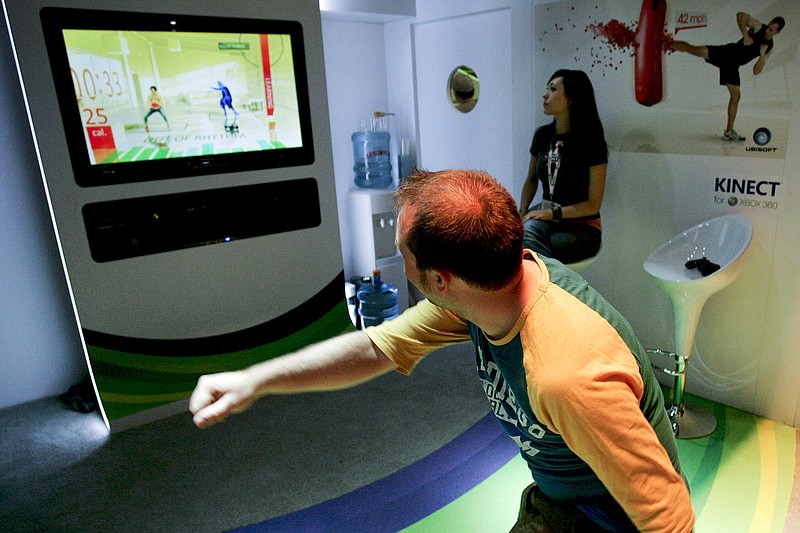LOS ANGELES — To appeal to families ready to graduate from the Nintendo Wii, Microsoft Corp. wants to build on the success of the Wii’s motion-capture wand - by getting rid of the wand entirely.
Microsoft last week detailed its new Kinect game technology, coming this fall for the Xbox 360 game console. Once known as Project Natal, the Kinect system recognizes users’ gestures and voices, so the user can control on-screen avatars in racing, action and sports games by moving his body.
Microsoft showed off a game based on Star Wars,headed for stories in 2011, that will use Kinect to let players swing virtual lightsabers in their living rooms. Also demonstrated was a dance title from the makers of Rock Band that eliminates the need for controllers and high-tech mats to get moving.
Kinect’s voice feature also means the user can say “pause” or “play” when watching a movie on the Xbox instead of reaching for the remote. And it has a video chat function that can connect people from different sides of the country, demonstrated by Microsoft last week at the Electronic Entertainment Expo in Los Angeles.
The video game conference attracted an estimated 45,000 people, many of them industry insiders.
Kinect will go on sale Nov. 4 in North America, Microsoft said. Prices were not disclosed, and it’s not clear whether Kinect will come with new Xboxes or only be sold separately. The technology works with existing systems, as well as a new version of the Xbox console that goes on sale this week.
The smaller, sleeker model with built-in Wi-Fi and a 250 gigabyte hard drive will cost $299, a price that previously would get the buyer a hard drive with half the capacity.
Until now the Xbox has been mainly known as the device to play hard-core “shooter” games such as Call of Duty and Halo. Microsoft ranks second in console sales to Nintendo, just ahead of PlayStation maker Sony Corp.
“We’ve established ourselves as a strong No. 2,” said Dennis Durkin, chief operating officer of Microsoft’s video game business. He called the launch of Kinect an inflection point for Xbox, adding “We’re not content with being No. 2 any more.”
Since the original Xbox launched in 2001, the video game system has been part of three money-losing divisions. Microsoft doesn’t break out results from the Xbox, but in total, the divisions that housed the game unit reported operating losses of about $7.45 billion from fiscal 2002 through 2007.
The group, which now includes Xbox, Zune media players, Windows phone software and the touch-screen Surface table computer, finally became profitable with operating earnings of $497 million in fiscal 2008 and $169 million in fiscal 2009.
The most recent figure was less than 1 percent of the company’s total operating income.
Scott Steinberg, video game analyst and most recently founder of Game Exec magazine and Game Industry TV, said the most exciting applications of Kinect are the uses that go beyond gaming, like video chat and the ability to select and watch movies without the need for a remote controller.
It opens up new possibilities for interfacing with technology - for instance, calling up movies and TV shows with the flick of a wrist or interacting with virtual pets with just a smile, he said.
Though it is working to broaden its reach, Microsoft is still trying to nurture its loyal gamer fans, who reliably buy sequels to blockbusters like Halo and Gears of War.
To that end, the company last week announced an exclusive deal with Activision Blizzard Inc., the maker of the Call of Duty games, that will bring downloadable content known as “map packs” to the Xbox first (and then Sony’s PlayStation 3) through 2012. Such extra content is an increasingly important business for video game makers because they can extend the life of games.
Information for this article was contributed by Jessica Mintz of The Associated Press.
Business, Pages 19 on 06/21/2010
